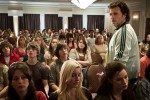David Wozniak wakes up one day to discover that he has 533 children.
A seemingly impossible fact, this is the basis for Canadian director Ken Scott’s latest French-language comedy. “Starbuck” is the inspiring and well-told tale of an eternal man-child working at his family’s butcher shop who is shocked to discover that his sperm donations in the ’80s under the alias “Starbuck” resulted in an obscene amount of offspring.
As Wozniak (Patrick Huard) is struggling with the news of his girlfriend Valérie’s pregnancy, he is shocked to discover that his biological children (now mostly in their twenties) are convening in an effort to sue the fertility clinic and discover the identity of Starbuck.
Although Wozniak is desperate to keep his identity unknown, his curiosity gets the best of his infantile personality. As he slowly begins to seek his children out, he becomes a sort of guardian angel for many of them, including his aspiring actor son and drug-addicted daughter.
“Starbuck” goes beyond the limits of a stereotypical comedy and surpasses its apparently simple plot. Scott’s ability to make the movie raw and realistic, with artsy cinematographic and dialogic elements of an award-winning drama, is what distinguishes it from similar comedic efforts. The film is mostly set in rainy Montreal, which surprisingly provides a rich and colorful tone in terms of the mise en scène, as well as in sets like Wozniak’s apartment and his family’s butcher shop.
In addition to the movie’s outstanding cinematography, Patrick Huard’s performance as Wozniak is superb. Although an immature and occasionally frustrating character, Wozniak is brought to life by Huard’s affable persona, and manages to warm the audience’s hearts like a giant teddy bear despite his wrongdoings.
There was also an apparent and delightful camaraderie between Wozniak and Avocat (Antoine Bertrand), Wozniak’s best friend and less-than-competent lawyer. Bertrand’s deadpan humor and ironic remarks about the irritating nature of his multiple young children made for a memorable dynamic, particularly in a story centered around offspring.
Other acting highlights included the performances of Wozniak’s kids. In this category, the standout was David Michaël’s portrayal of Antoine, Wozniak’s emo-punk son who discovers Wozniak’s true identity early on in the film and asks to move in for a while. A rocky relationship at first, it is cemented by Michaël’s touching yet strangely comedic performance. Although Antoine is initially aggressive toward Wozniak and pesters him incessantly, he ultimately proves to just be a troubled child in need of a father figure, even saying that he doesn’t want the other kids to discover Wozniak’s identity so he can have Wozniak all to himself.
The dialogue of “Starbuck” by Scott and co-writer Martin Petit is witty and entertaining, regardless of the fact that it is interpreted through subtitles. Huard and Bertrand’s natural and quick delivery of lines, as well as their comedic timing, translates across the language barrier.
While the movie has a number of strengths, at times it comes off as a bit unrealistic, beginning with the fact that someone even has 533 children.
It is also a bit puzzling that almost none of Wozniak’s offspring suspect his identity, although he is inexplicably present at almost all of their get-togethers and has met many of them separately.
Yet ultimately “Starbuck” succeeds in its pure entertainment value. By constantly shifting glimpses into the lives of Wozniak’s many children, family and friends, Scott ensures that the film continuously engages the audience by adding fresh stories and points of view, therefore ridding the film of dull moments.
So for those looking to laugh, cry and enjoy a foreign film of rare quality, “Starbuck” meets the criteria to a T.
